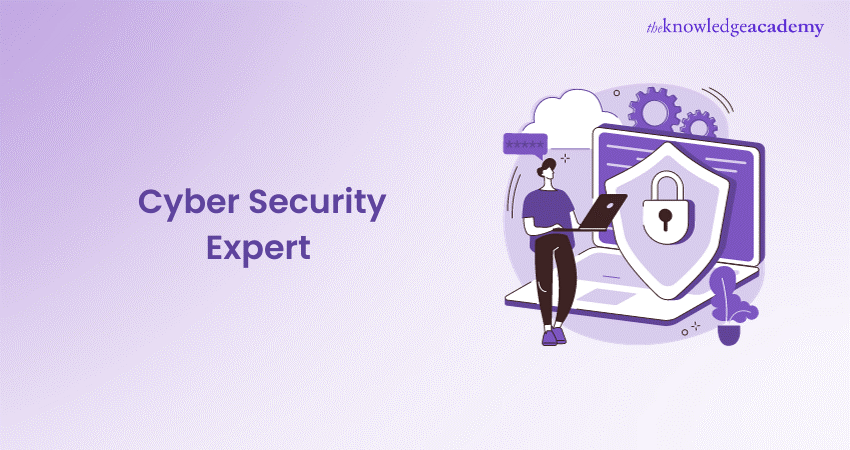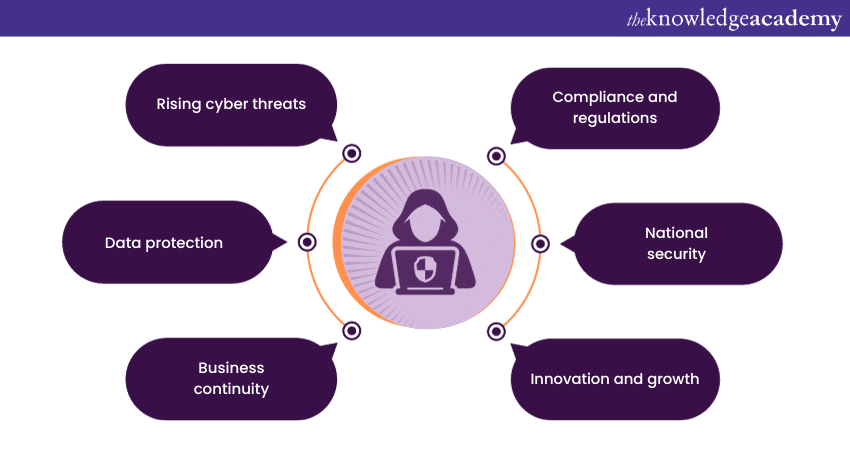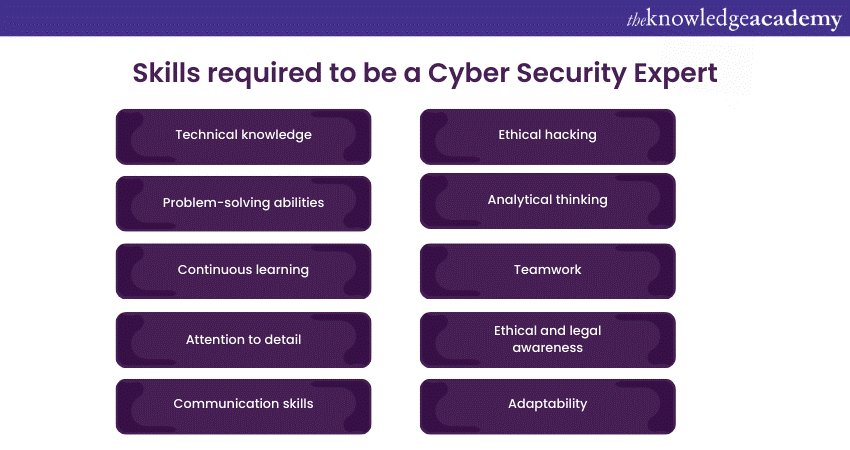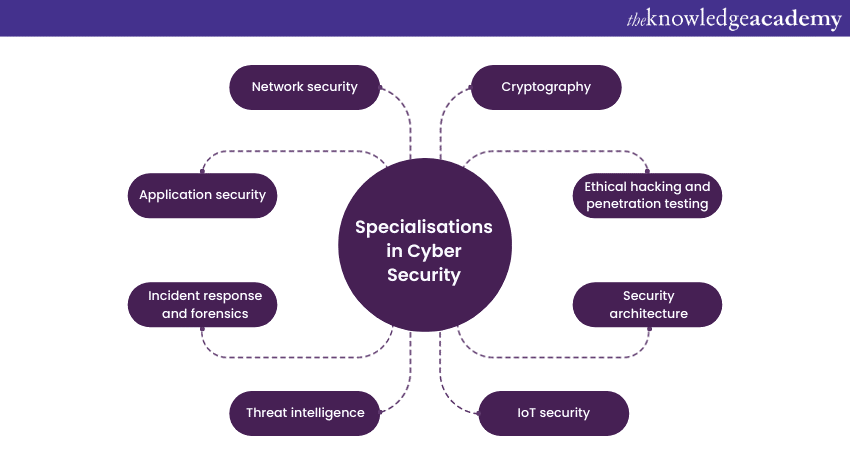We may not have the course you’re looking for. If you enquire or give us a call on +1 6474932992 and speak to our training experts, we may still be able to help with your training requirements.
Training Outcomes Within Your Budget!
We ensure quality, budget-alignment, and timely delivery by our expert instructors.

In today's digital age, where data is a valuable commodity and the internet is a playground for both good and malicious actors, the role of a Cyber Security Expert is more critical than ever. As the guardians of digital fortresses, Cyber Security Experts play a pivotal role in protecting systems, networks, and sensitive information from cyber threats.
If you're just starting your journey in the world of cyber security, this blog will help you understand how to become a Cyber Security Expert and what this profession entails.
Table of Contents
1) Who is a Cyber Security Expert?
2) Why do we need Cyber Security Experts?
3) Role of a Cyber Security Expert
4) Skills required to be a Cyber Security Expert
5) Steps to becoming a Cyber Security Expert
6) Specialisations in Cyber Security
7) Future of Cyber Security Experts
8) Conclusion
Who is a Cyber Security Expert?
A Cyber Security Expert is a professional who specialises in safeguarding digital systems, networks, and sensitive information from a wide range of cyber threats. These experts are the frontline defenders against malicious hackers, cybercriminals, and other hazards in the digital realm. They possess a deep understanding of security principles and a solid technical skillset that allows them to anticipate, detect, and respond to security breaches.
Cybersecurity experts play a pivotal role in today's increasingly connected world, where data is a valuable asset, and cyberattacks are on the rise. They are responsible for assessing vulnerabilities in systems, implementing security measures, and staying vigilant against emerging threats. Their duties encompass a multitude of areas, including network security, application security, and threat analysis.
To excel in this profession, cybersecurity experts must continuously learn, adapt, and stay updated with the latest security technologies. They not only possess technical prowess but also a security-conscious mindset that prioritises data protection, privacy, and ethical practices in the ever-evolving landscape of cyber threats.

Why do we need Cyber Security Experts?

Cybersecurity professionals serve as the frontline defenders against a relentless onslaught of cyber threats. Here are several compelling reasons why we need cybersecurity experts:
1) Rising cyber threats: The digital landscape is fraught with ever-evolving threats, from malicious hackers and cybercriminals to nation-state actors. Cyber Security Experts are essential in identifying, mitigating, and preventing these threats.
2) Data protection: As organisations collect and store vast amounts of sensitive data, the safety of this information is vital. Cyber Security Experts ensure that personal and corporate data remains confidential and secure.
3) Business continuity: Cyberattacks can disrupt business operations, causing financial losses and reputational damage. Cyber Security Experts work to safeguard systems, ensuring business continuity.
4) Compliance and regulations: With stringent data protection regulations like GDPR and HIPAA, organisations must adhere to legal requirements. Cyber Security Experts assist in compliance and mitigate legal risks.
5) National security: In the context of national security, cyber-attacks on critical infrastructure and government systems can have devastating consequences. Cyber Security Experts play a crucial role in safeguarding a nation's interests.
6) Innovation and growth: A secure digital environment fosters innovation and economic development. Cyber Security Experts enable organisations to innovate with confidence, knowing that their digital assets are protected.
Role of a Cyber Security Expert
A Cyber Security Expert plays a pivotal role in safeguarding digital systems, networks, and data from an ever-evolving landscape of cyber threats. These professionals are the frontline defenders against malicious actors seeking to exploit vulnerabilities and compromise security. Their responsibilities encompass several critical areas.
First and foremost, Cyber Security Experts are tasked with identifying and assessing potential risks. They meticulously analyse systems and networks to uncover vulnerabilities and potential weaknesses. They then design and implement robust security measures to mitigate these risks effectively.
Additionally, they constantly monitor systems for unusual activities, swiftly responding to any security breaches. Their expertise extends to incident response, enabling them to contain and mitigate the impact of breaches while minimising damage. They are also responsible for keeping systems up to date with the latest security patches and protocols.
Furthermore, Cyber Security Experts are often engaged in educating organisations and individuals about best practices for maintaining a secure digital environment. Their role is not just reactive but also proactive, contributing significantly to the prevention and mitigation of cyber threats, making them indispensable protectors of the digital realm.
Famous Cybersecurity Experts
The work of some famous Cyber Security Experts has not only helped organisations protect sensitive data but has also raised awareness about the importance of cybersecurity in an increasingly connected world. Here are a few renowned cybersecurity experts who have left a lasting impact:
1) Kevin Mitnick: Often referred to as the "world's most famous hacker," Kevin Mitnick was once a notorious cybercriminal. After serving prison time for his activities, he transformed into an ethical hacker and security consultant. He authored books, including "The Art of Invisibility," and founded Mitnick Security, advising governments and Fortune 500 companies.
2) Bruce Schneier: A cryptography and security expert, Schneier is a respected author and lecturer. His book "Applied Cryptography" is a foundational work in the field. He has also been an advocate for privacy and has written extensively on security issues.
3) Mikko Hyppönen: A globally recognised security expert and the Chief Research Officer of F-Secure, Hyppönen has been at the forefront of fighting malware and cyber threats. He is a sought-after speaker and commentator on cybersecurity topics.
4) Eugene Kaspersky: As the CEO of Kaspersky Lab, Eugene Kaspersky has played a crucial role in developing one of the world's leading cybersecurity companies. His work in antivirus software and cyber threat research has made him a key figure in the industry.
5) Whitfield Diffie and Martin Hellman: These two researchers are renowned for their groundbreaking work in public-key cryptography. Their invention of the Diffie-Hellman key exchange protocol revolutionised secure communications and laid the foundation for modern encryption techniques.
6) Brian Krebs: Known for his investigative journalism in the field of cybersecurity, Krebs has been instrumental in exposing cybercriminal activities. His blog, KrebsOnSecurity, is a trusted source for in-depth cybersecurity reporting.
7) Joanna Rutkowska: A pioneer in the field of rootkit research, Rutkowska is known for her work on security technology and malware. She has contributed to the development of security solutions and the exploration of advanced persistent threats.
Skills required to be a Cyber Security Expert

Becoming a proficient Cyber Security Expert requires a unique skill set that combines technical prowess, critical thinking, and ethical responsibility. Here are the key skills required to excel in this dynamic field:
1) Technical knowledge: Cybersecurity experts must have a deep understanding of computer systems, networks, and software. They need to be well-versed in operating systems, programming languages, and the intricacies of digital infrastructure. Proficiency in areas like network security, encryption, and malware analysis is crucial.
2) Problem-solving abilities: The ability to identify, analyse, and resolve complex security issues is a fundamental skill. Cyber Security Experts often face novel threats, and their problem-solving skills are essential in devising innovative solutions.
3) Continuous learning: The cyber security landscape evolves rapidly. Keeping up with emerging threats and technologies is vital. Cybersecurity experts must be committed to ongoing learning and staying updated with the latest trends and best practices.
4) Attention to detail: Cybersecurity experts need an eye for detail to detect anomalies in large data sets and recognise subtle indicators of security breaches. This skill is invaluable for threat identification and prevention.
5) Communication skills: Effective communication is essential when explaining complex security concepts to non-technical stakeholders. Cybersecurity experts must convey risks, solutions, and policies clearly and concisely.
6) Ethical hacking: Understanding the techniques used by malicious actors is crucial for defence. Ethical hacking skills allow experts to identify vulnerabilities through penetration testing and security assessments.
7) Analytical thinking: Cyber Security Experts must think critically, analysing the impact of potential threats and devising strategies to mitigate them. They need to assess risks and make informed decisions.
8) Teamwork: Collaboration is often necessary in the cyber security field. Working with colleagues, incident response teams, and law enforcement agencies to address security incidents and breaches requires strong teamwork and communication.
9) Ethical and legal awareness: Cyber Security Experts should have a strong ethical compass, understanding the boundaries of lawful and ethical behaviour. Compliance with legal regulations and ethical standards is essential.
10) Adaptability: Cybersecurity is a field that never stands still. The ability to adapt to new threats and technologies is critical. Experts must be agile in their approach to tackling emerging challenges.
Equip your team with the skills to respond swiftly and effectively to cyber incidents – Register for our Incident Response Training today!
Steps to becoming a Cyber Security Expert
Becoming a cybersecurity expert is a structured process that involves education, certifications, practical experience, and networking. Here are the steps to follow on your journey to becoming a cybersecurity expert:
Step 1: Get a minimum required education
A solid foundation in cybersecurity often begins with a formal education. Most cybersecurity positions require at least a bachelor's degree in a relevant field such as computer science, information technology, or cybersecurity. Additionally, gaining two years of professional experience in tasks like incident detection and response and forensics is typically required. Understanding how firewalls function and operating endpoint security measures is essential.
Step 2: Specialise in industry certifications and clearances
Obtaining industry certifications and clearances is a crucial aspect of preparing for a career in cybersecurity. Certifications not only validate your skills but also demonstrate your commitment to the field. While not always necessary at the beginning of your career, certifications can boost your expertise and career prospects. Some popular certifications include:
1) EC-Council Network Security Administrator (ENSA): Focuses on network security administration and setting security policies for organisations.
2) Cisco Certified Network Associate - Routing and Switching (CCNA): Demonstrates your ability to manage complex networks.
3) Certified Information Security Manager (CISM): Geared towards management roles, focusing on information security planning and maintenance.
4) Certified Information Systems Security Professional (CISSP): A globally recognised certification that showcases your technical proficiency in designing and managing security programs.
5) CompTIA's Popular Base-Level Security Certification (Security+): An entry-level certification covering fundamental cybersecurity skills suitable for those starting their careers.
Elevate your cybersecurity career with the CISSP Certification Course and become a certified expert in information security.
Step 3: Use your theoretical knowledge for experience and work
Gaining hands-on experience is vital in the cybersecurity field. This can be achieved through internships, related work experience, or structured hands-on learning opportunities. Practical experience helps you apply your theoretical knowledge to real-world situations.
Step 4: Get out there - Socialise and network
Building a professional network is essential in cybersecurity. Join cybersecurity clubs and organisations that focus on networking and professional growth. These networks can provide valuable insights into job opportunities and emerging trends in the field.
Elevate your Cyber defence strategy with our Cyber Security Risk Management Course and stay ahead of evolving threats.
Specialisations in Cyber Security

Cyber security as a field has a range of specialisations that cater to the unique interests and skill sets of individuals. These specialisations address specific areas of cyber threat prevention, detection, and mitigation, ensuring that experts are well-equipped to defend against diverse digital dangers. Here are some notable specialisations in the field of cyber security:
1) Network security: Network security experts focus on safeguarding an organisation's data as it traverses through computer networks. They design and manage firewall intrusion detection systems and implement secure protocols to protect against unauthorised access and data breaches.
2) Application security: Application security specialists concentrate on securing software and applications, identifying vulnerabilities, and ensuring secure coding practices. They play a vital role in preventing exploitation through applications.
3) Incident response and forensics: Professionals in this specialisation are like digital detectives. They investigate security incidents, such as data breaches or cyberattacks, to determine their origins, scope, and impact. They gather digital evidence and assist in recovery and mitigation efforts.
4) Threat intelligence: Threat intelligence experts monitor the evolving threat landscape, staying ahead of cybercriminals. They collect and analyse data to provide organisations with actionable insights, helping them proactively defend against potential threats.
5) Cryptography: Cryptographers focus on developing and managing encryption methods to protect sensitive data from unauthorised access. They design and implement cryptographic algorithms, and their work is crucial for ensuring data confidentiality.
6) Ethical hacking and penetration testing: Ethical hackers, also known as white-hat hackers, simulate cyberattacks to identify vulnerabilities in systems and networks. They help organisations strengthen their security by finding weaknesses before malicious hackers do.
7) Security architecture: Security architects design and implement security systems and strategies that cover the entire organisation. They ensure that security measures are integrated into the overall infrastructure.
8) IoT security: With the rise of the Internet of Things (IoT), experts in this field focus on securing interconnected devices and systems, safeguarding against potential vulnerabilities in the IoT ecosystem.
Future of Cyber Security Experts
Cybersecurity is constantly evolving, marked by ever-advancing threats and technological developments. As a result, the future of cybersecurity experts is poised to be both challenging and promising. Here's a glimpse of what lies ahead for these vigilant guardians of the digital realm.
1) Increasing demand: The demand for Cyber Security Experts is on an upward trajectory. With the proliferation of digital technology in every aspect of life and business, the need for robust protection against cyber threats is only set to grow. Organisations will rely heavily on experts to safeguard their sensitive data and systems.
2) Evolving threats: Cyber threats are becoming more sophisticated. Experts will need to adapt and develop innovative strategies to combat these evolving challenges, from AI-driven attacks to quantum computing threats.
3) Cybersecurity automation: While the human element will always be essential, automation in cybersecurity will be increasingly prominent. Experts will work alongside automated systems to enhance threat detection and response.
4) Specialisations: The field of cyber security is diversifying into various specialisations, such as IoT security, cloud security, and blockchain security. Cybersecurity experts will find opportunities to specialise and become niche experts in these areas.
5) Regulatory changes: As governments and industry standards evolve, experts will need to stay abreast of changing regulations. Compliance and adherence to new data protection laws will be a significant part of their responsibilities.
Level up your digital defence - Join our Cyber Security Training today and protect what matters most!
Conclusion
Becoming a Cyber Security Expert is a challenging yet rewarding journey. In this guide, we've covered the definition, significance, and various aspects of this profession. We've explored the educational path, specialisations, skills, and mindset required to excel in the field. Whether you're a newcomer or someone considering a career change, the world of Cyber Security Experts offers a dynamic and promising future in the digital age.
Frequently Asked Questions
Upcoming IT Security & Data Protection Resources Batches & Dates
Date
 Certified Cyber Security Professional (CCS-PRO)
Certified Cyber Security Professional (CCS-PRO)
Fri 17th Jan 2025
Fri 21st Feb 2025
Fri 4th Apr 2025
Fri 6th Jun 2025
Fri 25th Jul 2025
Fri 7th Nov 2025
Fri 26th Dec 2025







 Top Rated Course
Top Rated Course


 If you wish to make any changes to your course, please
If you wish to make any changes to your course, please


